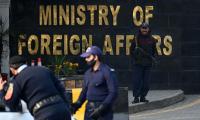ISLAMABAD: The combined opposition in the Senate on Monday put forth a question as to what political price would have to be paid in exchange of the IMF package.
The opposition feared the Egypt model of governance and economy was to be implemented in Pakistan, being completely unacceptable to the masses. However, the treasury benches played it down and said that the agreement with the IMF was nothing new, as it had been done in the past several times. The treasury benches made it clear that there would be no compromise on national interest.
Taking part in the debate regarding the recent increase in prices of petroleum products, former Senate chairman Mian Raza Rabbani strongly objected to the statement made by the International Monetary Fund (IMF) officials that the agreement was endorsed by its executive board. He asked if Pakistan would have to play any role against Iran.
Rabbani pointed out while the IMF was not ready to finalise the agreement without approval of its executive board, ‘our adviser to the prime minister announced it without taking the Council of Common Interests (CCI), cabinet and parliament into confidence.
He regretted, “IMF says that this agreement will not go ahead unless prior actionable things are done, which included Rs7 billion additional taxes, 200 percent interest rates, and the most dangerous thing which is there will be a tsunami of crisis i.e. 20-30 percent further rupee devaluation and further increase in oil, gas and electricity prices”.
Rabbani cautioned that it was a hybrid war about which they should be careful, as the US was using institutions like the IMF for its political leverage. He continued that Egypt model of governance and economy was being implemented in the country which, he categorically said, was in no way acceptable.
Senator Mohsin Aziz of PTI strongly defended the government decision to increase the petroleum prices, saying the prices were still under control, as compared to the past governments of PPP and PML-N and blamed them for increasing prices.
He said that Pakistan had knocked at the IMF door for 22 times in the past, of which the previous PML-N government, availed itself of the bailout packages for 12 times. He added that the economy of Egypt improved due to IMF packages, and asserted criticism on the new State Bank of Pakistan Governor Reza Baqir was not acceptable, as the past regimes also hired people working for IMF as governors of the central bank on numerous occasions.
He threw up a challenge to his fellow senators, “If you are so concerned about the woes of the poor people, let us move a resolution and pledge our salaries for building a hospital for the poor in Islamabad”.
Mir Kabir Shahi of the National Party said that masses never had to face such difficulties and added that the indirect taxes and increasing price of edible items, etc, showed that all harsh conditions put forth by IMF were blindly accepted. Senator Mustaq of the JI said that the IMF bailout package was rather a “sellout Pakistan package” and that the first tranche, which they would get in six months, is no less than economic and political surrendering.
PML-N Senator Pervaiz Rashid said that all the past governments announced Ramazan packages far ahead of the holy month, but this government gifted petrol bomb to people. About removal of Asad Umar as finance minister, he said PM Imran Khan used to call him his right-hand and he cut down his own right hand and opted for implanted ‘rented arm in shape of Hafeez Sheikh, which shows his political acumen and vision about the country.’
Usman Kakar of PkMAP alleged that PTI government had agreed to a deal with international and local establishment to prolong its rule. He said that 80 percent development projects for Balochistan had been stopped. “The only project which, is at full swing is marriages of Pakistan women with Chinese…no country of the world is into this business with Chinese except us which is quite shameful,” he regretted.
Senator Nauman Wazir Khattak of PTI said that agreement with IMF was a staff level pact and that both parties would go to their respective authorities. He said that before every agreement, there were prior actionable things, then first tranche is released, as there was nothing new about it.
Minister for Petroleum Division Omer Ayub said that petroleum prices in Pakistan were less than those in the regional countries including India, Bangladesh and Sri Lanka.
Winding up discussion on an adjournment motion, he said the government did not pass on the actual impact of the international increase in the prices of petroleum products to the people and provided relief of Rs58 billion. He said, “We have also reduced petroleum development levy and sales tax on petroleum products”. Omer Ayub said the issue of circular debt would be overcome by December next year.
He said the efforts were afoot to increase the share of renewable energy in the energy mix to thirty percent by 2030. Omar Ayub said during 2017-18, the circular debt had increased by Rs450 billion, which would be brought down to zero on December 31, 2020.
The minister contended that it would all be possible due to ongoing reforms in the power sector, as strict measures were being taken to remove impediments in power transmission, curbing power theft and cope with the issue of circular debt.
He said that in five months, the government increased Rs61 billion revenue in power sector and efforts were under way to increase the share of renewable energy in the energy mix to 30 percent by 2030.
The minister noted that no loadshedding was being done in any parts of the country during sheri and iftar times. “We have also reduced PDL [petroleum development levy] from Rs300 billion to Rs200 billion. We need to give attention to conservation, as our total energy demand which also included petroleum and other products, is equivalent to 84 million ton, of which 75 percent is wastage, which needs to be plugged in,” he added.
Khawar Manika's counsel continued his arguments on Wednesday in a petition filed by Imran Khan and Bushra Bibi
IHC reserved judgment on the petition against registration of cases against former interior minister Sheikh Rashid on...
Saudi woman who was reportedly kidnapped from Islamabad’s residential Sector F-8 in mysterious circumstances, has...
Pakistan Navy warship rescued 8 Iranian fishermen after their boat caught fire in the open sea
SC dismissed appeal against SHC order that turned down application of partner seeking extension of time to furnish...
Executive board of International Monetary Fund will meet on April 29 to discuss the approval of $1.1 billion funding...







